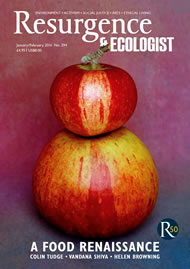One thesis laid out in 10 chapters: being “more human” is a must in a world controlled by big companies, big money, big government. Resurgence & Ecologist readers know this only too well: E.F. Schumacher, Leopold Kohr, David Korten, Vandana Shiva and other authors have told us so. In many ways Steve Hilton follows in their footsteps without actually mentioning them as intellectual forebears.
One big difference, however: many Resurgence authors have been – and still are – voices in the wilderness. Steve Hilton, on the other hand, was a senior adviser to David Cameron during the Conservative–Liberal Democrat coalition government of 2010–15. Now he runs the consultancy Crowdpac in Silicon Valley, which describes itself as “the definitive resource for objective data on US political candidates”.
Hilton is serious in his concern about big business: “We need to take power out of the hands of the big money donors and the big unions and big business and put it back where it belongs – in the hands of the people.” But how does this forthright statement square with his intimate involvement in Conservative politics?
This book is a fluent portrayal of a world dominated by BIG, interspersed with many case studies of how well-meaning entrepreneurs are working to build an alternative world – in business, as social actors, in urban planning, in health, in education, in agriculture. It is a passionate book and a page-turner. Optimism and pessimism about the human condition are interspersed in rather intriguing ways.
The main focus of the book is the UK and the US, though many of the most positive case studies are from Scandinavia. Finland has the best, most human education system. Denmark is the most equal society. Copenhagen is probably the world’s most liveable city.
The UK and the US are portrayed as the Western countries most dominated by large, centralised structures and by big business interests. “[T]he assumptions, the structures, the rules that govern our lives are not subject to anything as unpredictable as the will of the people... We need to make democracy work as it was intended to, as a vehicle for real people power, not the plutocratic power we have today.” This is strong stuff, and this passion for a “more human” world permeates the book.
Hilton is an advocate of “good business” – capitalism with a conscience. And he is not an “anti-globaliser”: he argues that globalisation has raised hundreds of millions of people out of poverty, and that trade has given countries in Asia, in particular, access to Western markets and has increased standards of living there. But at what cost? He scarcely alludes to the externalities – pollution of rivers and soils, the toxic air above vast new cities, climate change due to fossil-fuel burning on an unprecedented scale.
Incidentally, Hilton does quote Schumacher once: namely his dictum that, if man won his battle with Nature, “he would find himself on the losing side.” This powerful statement, quoted towards the end of the book, also highlights its primary weakness: it barely mentions our vast impacts on ecosystems and the legacies with which we are burdening future generations. There is a profound lack of concern about David Ehrenfeld’s “Arrogance of Humanism” in Hilton’s writing.
But a particularly positive feature of Hilton’s book is his passion for the wellbeing of children: their mental and physical health, the impacts of online pornography, the problems of rigid, centralised education systems, and the lack of freedom to roam, to be wild.
More Human is an intriguing mix of nostalgia and hard-headed analysis of a world in which the power of monopolies and bureaucracies needs to be reined in. It is certainly a worthwhile book. I am told that Hilton’s voice still echoes in the corridors of Downing Street, all the way from northern California. But after an elaborate, even passionate plea for a more human world, Hilton doesn’t really explain how the power of bigness can be effectively tamed.






